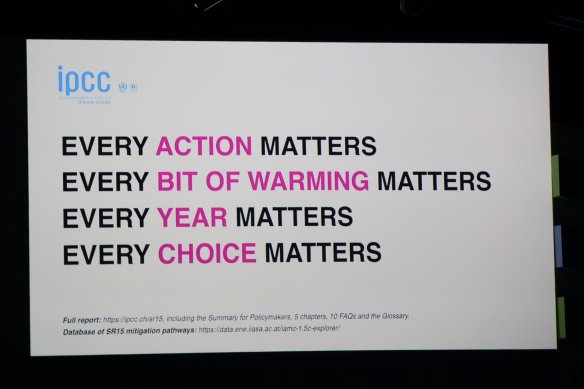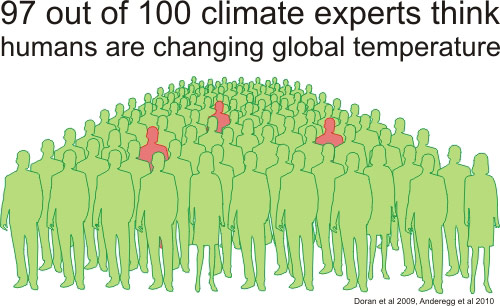There is only plain ol’ science used to study the climate and modern scientists have been studying climate for over 100 years. The greenhouse effect was first named and explained by Swedish scientist Svante Arrhenius (1859-1927) in 1896; he received a Nobel Prize for his work in 1903. Since then more scientific research has piled up evidence of the impact of releasing greenhouse gases into the atmosphere. The most significant greenhouse gases of concern are CO2 and methane (CH4). Industrialization and the explosion of human populations and agriculture and animal agriculture have all dramatically increased the amount of greenhouse gases being released. It is important to note that almost all of these increases have to do with human populations and human activities. Scientific models have predicted changes in temperature, changes in climate, and in sea level rise which correspond with rises in CO2 and CH4 in the atmosphere. All of those predictions are now being observed in real time.
WE are living in the AGE of CLIMATE CHANGE, it was once a theory, now it is a reality, OUR REALITY. We can no longer avoid dramatically altering our atmosphere through greenhouse gas emissions–we have already done that. The climate change education and advocacy organization 350.org is named for a number used to measure the amount of CO2 in the atmosphere, 350 parts per million. This WAS the goal to avoid drastic climate change scenarios. Before industrialization, the amount of CO2 in our atmosphere was around 275 parts per million. We are now beyond 400 parts per million and our planet is generating historic storms, droughts, and those are producing historic floods and forest fires. The destruction linked to climate change related weather disasters in 2017 is estimated to be $330 billion.

The catastrophic fires and floods we have seen over the past decade or so and the costs of their damages is but a fraction of the cost and destruction that is guaranteed to increase if emissions do not dramatically decline, which is why we must take this challenge seriously and shut off emissions of greenhouse gases! The most knowledgeable scientists tell us that we must cut them in half within 12 years and completely eliminate emissions from fossil fuels by 2100. Our priority must be ramping up efforts on every front to radically reduce emissions by 50% within the next 12 years. The momentum of such radical transformations will help ensure reaching the longer range target of zero or even negative emissions (through carbon sequestration–e.g. expanding of forest cover).
While this transformation is clearly daunting we must embrace the challenge and see it as an OPPORTUNITY to build and even BETTER future. The Green New Deal is one such vision, probably the best. In Canada there is the Leap manifesto. These are two comprehensive approaches to building a better tomorrow which include replacing dirty sources of energy with clean ones. They also include increasing prosperity for working people and ensuring that the wealthiest, those with hundreds of millions or billions of dollars in wealth, pay their fair share to clean up the mess that much of their wealth has been built on, especially in fossil fuel industries. Fossil Fuel companies know they are on the hook, which is why they have spent billions to buy politicians, fight legislation promoting clean energy and policies to reduce greenhouse gas emissions, and spread misinformation about the science of climate change.
Part of a just future will mean those who have profited from misleading the public on climate change will be prosecuted, the sooner the better, so that the narrative can shift from one of obfuscation to one of truth.
The Green New Deal evokes a war time mobilization to transform our energy systems and systems of social welfare. The LEAP emphasizes that small steps aren’t enough, we must LEAP into a better future. To get such massive programs moving will require ALL of US who believe in the science and who care about the health of the planet or our children’s future must pressure our government and corporate leaders to embrace these radical solutions. At the same time we can help make this shift by choosing cleaner alternatives. Such cleaner alternatives have become more accessible and available than ever. Solar prices have plummeted. Today more than 20% of Australian homes have solar panels! The adoption of hybrid and electric vehicles helps to reduce emissions, but to ensure this they need to be powered by sun, wind, hydro or geothermal sources. This can be done, it won’t be overnight or easy, but it can be done. See scenarios for 100% clean energy for 139 nations by Stanford scientist Mark Jacobson.

Another important step for those who believe the science and wish to do more is to reduce and, if possible, eliminate beef from your diet and reduce, or eliminate, dairy products. Beef and dairy are connected to livestock which are a major source of methane (CH4) into the atmosphere. They are also a driver of deforestation, especially in the Amazon (the lungs of the world). As consumers we can influence corporate behavior. Stop buying gas-guzzling SUVs and car manufacturers will stop making them! Stop buying beef and milk and ranchers will switch to other (less resource intensive) animals or solar or wind farming! In a just transition, the government will help ranchers with this transition, as they spread information about the negative health impacts of beef consumption and promote the end of industrial livestock systems.

As always there will be winners and losers. The end will be a better world for everyone, our children and future generations. If we don’t act with urgency things will get very bad. If you want to know just how bad things could get see here or here. Unchecked climate change not only permanently floods islands and coastal regions (goodbye southern Louisiana and coastal Florida) it also impacts food supplies (crops will fail, yields will be reduced), more hunger, and more refugees spilling across borders. It is simply a nightmarish world that gets worse and worse. No one should wish it upon the children of today and that’s exactly what we do by not embracing radical change now. We are the generation that must do this. If we fail, the future is lost.
Ready to get started? I’ve already mentioned reducing or eliminating beef and dairy in your diet. A &W is ready to help, they now offer vegan “beyond meat” patties for all burgers across Canada, and if you live in an urban area you are sure to find more vegetarian and vegan options than ever. The next time you are shopping for a car look for electric vehicles and hybrids. If you can, install solar on your roof. Start making plans, start researching and saving. Be vocal about your concern. Let your local politicians and state or provincial leaders know you support the building of green infrastructure and rapid phasing out of coal and other fossil fuels. Pressure institutions and corporations you are part of to divest from fossil fuels. There’s lots we all can and must do. Let’s get busy!

For a start: Like/Share/Retweet! 🙂
Go here for additional ideas and explore my blog form more information.






